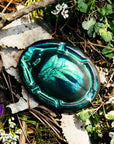
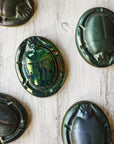
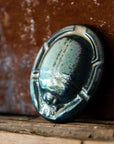
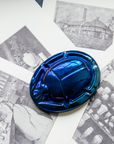
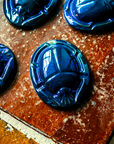
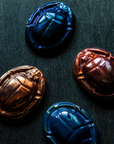
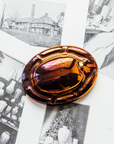
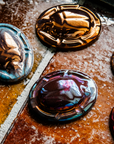
Scarab Paperweight | Iridescent
The Scarab Club in Detroit features a historic, sculpted Pewabic medallion designed by architect William Buck Stratton above its main entrance. Founded in 1907, it was a gathering place for artists and art enthusiasts. It was only fitting that Pewabic tile was commissioned for the exterior of the building in the late 1920s considering Pewabic Co-Founder Mary Chase Perry’s strong presence in the art and sculpture scene of Detroit.
Years later, the scarab came to symbolize renewal, transformation, and resilience throughout our establishment as a non-profit.
Iridescent Glaze
Many consider the Iridescent glaze to be Pewabic's most important contribution to ceramic art. Through trial, error, and sheer persistence, Mary Chase Perry Stratton developed her first successful Iridescent glaze in 1906. Establishing the formula and stabilizing the firing process took another three years.
Today our Iridescent pieces are fired somewhat similarly, though with safer materials. It requires a third firing and a process called fuming–– when vegetable oil is injected into the kiln to create extraordinary one-of-a-kind effects.
Copper Iridescent pieces often have blue-gray flashes of color that dapple the smooth surface of the copper-colored glaze.
Azurite Iridescent pieces often have flashes that range from silver to purple and green that accentuate this bold blue glaze.
- Paperweight measures slightly larger than 4" x 3" x 1"
- From our Egyptian-inspired Collection
- Handcrafted in Detroit
- High-fire stoneware individually hand-pressed and glazed by Pewabic artisans
- Pewabic logo stamped on the bottom
- Each tile has a notch on the back for hanging.
- Please note that this glaze has a high range. The Matte Green Iridescent glaze can range from a pearl-like matte finish to a higher gloss metallic finish. See the group photo on this listing to see this range potential.
- In Matte Green Iridescent, Copper Iridescent and Azurite Iridescent








